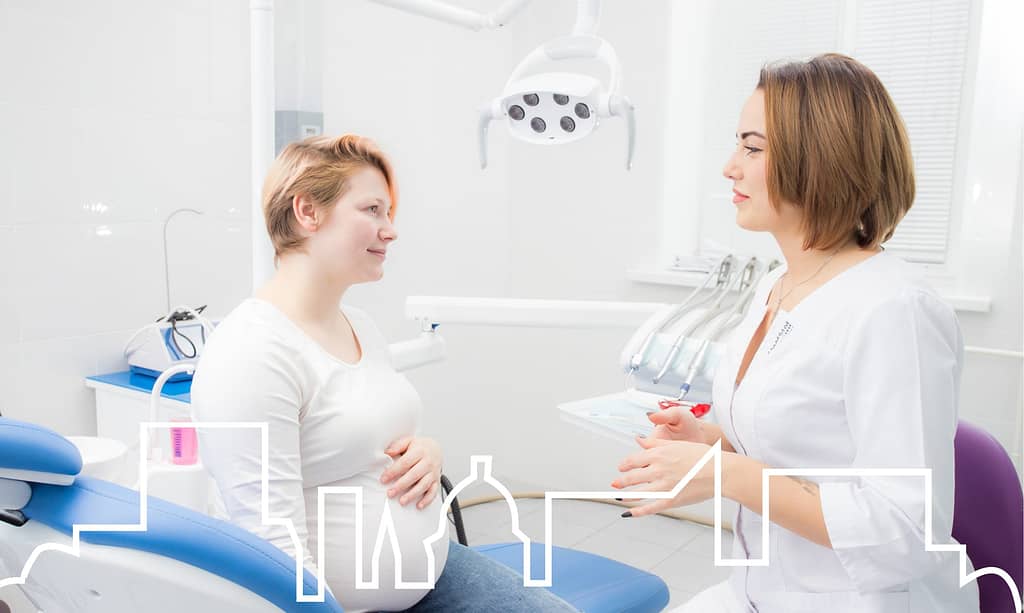Gum Disease and Pregnancy: 3 Things Expectant Parents Need to Know

Paying Attention to Your Oral Health During Pregnancy
Pregnancy affects practically every area of an expecting parent’s life, and oral health is no exception. You may experience changes to your mouth throughout your pregnancy, so paying attention during the entire pregnancy is crucial for your growing baby’s sake.
According to the Centers for Disease Control and Prevention (CDC), between 60 and 75 percent of pregnant people develop gum disease, which, when left untreated, can not only lead to tooth loss but also impact your baby’s health.
With that being said, it is vital to fully understand the connection between pregnancy and oral health to ensure you deliver a healthy baby.
1. Understanding the Link: Prostaglandin, C-Reactive Protein (CRP), and Bacteria Spread
Periodontal disease is a severe infection that affects an individual’s health in various ways, and in expectant parents, it exposes unborn babies to several risks.
There are several reasons why this connection exists, including the following.
Prostaglandin’s Role in Inflammation
Pregnancy triggers an abundance of hormonal changes within the body, many of which can cause dry mouth, impact your body’s response to plaque formation, and lead to or worsen gum disease.
Prostaglandin is a labor-inducing compound typically found within bacteria present in the mouths of pregnant patients. Periodontal disease (periodontitis) in its more advanced forms increases levels of prostaglandin. Higher levels of this hormone can lead to preterm deliveries and lower birth weights.
C-Reactive Protein and Systemic Inflammation
Pregnant patients with periodontal disease oftentimes have elevated CRP levels in their blood, which amplify the body’s natural inflammatory response. This protein, also linked to heart disease, has become associated with unfavorable pregnancy outcomes, including premature births and preeclampsia.
Bacteria Spread and Pregnancy Complications
Bacteria from gum infections can enter the bloodstream and travel to other parts of the body, and though this is true of any patient with gum disease, pregnant patients have their unborn child to consider. Researchers have found oral bacteria can spread to various locations, such as the mammary glands, coronary arteries, and the placenta, causing some pregnancies to result in preterm birth or low birth weight.
2. Gum Disease Impact on Pregnancy Outcomes
Many people find it challenging to maintain adequate oral health during pregnancy, but there are significant risks associated with having gum disease while pregnant, and they are as follows.
Preterm Birth and Low Birth Weight
One study shows that people who enter labor early were, in fact, 45% more likely to have gum disease than those who carried their baby to full term. As such, to ensure a smooth pregnancy, having a good home care routine and scheduling routine dental appointments with a family dentist in Boise, ID, is crucial.
Drinking alcohol and smoking also contribute to gum disease and can lead to low birth weights. These babies may also have improperly formed tooth enamel, which leads to their own poor dental health.
Gestational Diabetes and Preeclampsia
When a pregnant patient has gum disease, their risk of developing gestational diabetes—a form of diabetes that only develops during pregnancy and can lead to many health problems for both the patient and their unborn baby—as well as preeclampsia, which causes high blood pressure and protein in the urine, increases.
As an expecting parent, brushing your teeth for at least two minutes and flossing daily can help you manage your risk of contracting gum disease, and a dentist near Boise, ID, may also recommend special mouth rinses or toothpastes to help control inflammation and reduce the risk of developing an infection.
3. Maintaining Gum Health During Pregnancy and Seeking Safe and Effective Gum Disease Treatment
The most effective way to reduce dental health-related complications during pregnancy is to prevent periodontal disease, which you can do by scheduling regular dental check-ups and professional cleanings with a dental hygienist.
Between dental appointments, follow these oral hygiene tips to maintain optimal gum health at home.
- Use a fluoridated toothpaste.
- Replace your toothbrush every three to four months.
- Never share your toothbrush.
- Floss daily.
- Rinse nightly with a fluoridated, alcohol-free mouthwash.
- Chew sugar-free gum with xylitol after meals.
- Eat a balanced diet with fruits, vegetables, and whole-grain products.
- Avoid teeth whitening products.
Before using oral care products, ensure they do not contain alcohol, as they can be dangerous for your developing child.
In addition, keep yourself hydrated by drinking plenty of water throughout the day. Doing so will help rinse your mouth after meals and remove any remaining food particles.
In the event that you do develop gum disease, schedule treatment as soon as possible. Scaling and root planing are standard treatment options for the condition without any adverse reactions, but always clear your treatment with your obstetrician first.
Schedule Your Pregnancy Dentist Appointment With Staley Dental
Expectant parents should prioritize their gum health to protect their unborn babies. Seek professional dental care and manage any potential issues throughout your pregnancy, and if you notice swollen or tender gums, bleeding when you brush or floss, or red, discolored gums, contact a family dentist, like Staley Dental, to schedule an appointment.